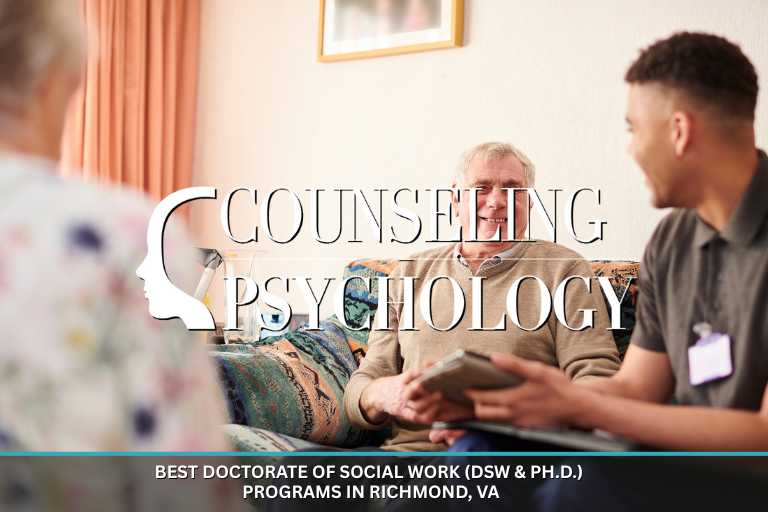Best Doctorate of Social Work (DSW & Ph.D.) Programs in Richmond, VA

Pursuing a Doctorate of Social Work (DSW) or a Ph.D. in Social Work in Richmond, Virginia, opens doors to advanced clinical practice, impactful research, and leadership roles in social services. As the demand for social workers continues to rise across the U.S., Virginia’s capital city offers unique opportunities for doctoral candidates to engage with diverse populations, contribute to systemic change, and influence policy at the local and state levels.
Richmond’s rich social history, combined with its evolving urban landscape, makes it an ideal environment for doctoral research and community-based practice. From policy think tanks to healthcare institutions and non-profits focused on racial equity and poverty alleviation, students here gain practical, regionally relevant experience. According to the U.S. Bureau of Labor Statistics, social work employment is projected to grow 7% through 2032—faster than the national average—making this a strategic time to pursue a terminal degree in the field.
This guide highlights Richmond's best DSW and Ph.D. programs, offering a roadmap to academic and professional advancement through actionable, evidence-based insights. By focusing on local relevance and academic excellence, these programs prepare graduates to make a meaningful impact in both clinical and academic settings.
Top Doctorate of Social Work and Ph.D. Programs in Richmond, VA for 2025
Why Pursue a DSW or Ph.D. in Social Work in Richmond?
Richmond offers a unique blend of academic excellence, community engagement, and professional opportunity for social work doctoral students. The city's population—diverse in race, socioeconomic status, and age—provides fertile ground for research and practical interventions. The city's historic and ongoing challenges around housing justice, mental health care access, and systemic inequality create real-world learning and leadership opportunities.
The city’s location along the I-95 corridor and its proximity to Washington D.C. further enhance its strategic value for doctoral students seeking to engage in regional or national advocacy work. Richmond also hosts numerous health systems, legal aid organizations, and mental health providers that collaborate with universities, offering valuable fieldwork and research partnerships.
Doctoral programs in Richmond emphasize both academic rigor and regional relevance. These programs are designed to support goals in policy advocacy, clinical practice, organizational leadership, and higher education instruction, all while addressing the critical social issues facing Virginia communities.
What to Expect from a DSW or Ph.D. Program
A doctoral program in social work prepares professionals for advanced roles in research, leadership, and education. These programs blend academic theory with applied practice to address pressing societal needs through evidence-based strategies. Curriculums typically include a combination of core theoretical frameworks, advanced research methodology, policy analysis, and elective coursework tailored to specialized interests.
Students also engage in long-term dissertation research projects that explore social work issues through both quantitative and qualitative lenses. Many programs emphasize interdisciplinary approaches, incorporating insights from psychology, public health, criminal justice, and education to enrich students' perspectives.
DSW vs. Ph.D.: What's the Difference?
While Richmond currently offers a Ph.D. in Social Work, understanding the difference between a DSW and a Ph.D. can help guide broader exploration:
- Ph.D. in Social Work: Research- and theory-focused, often leading to academic or policy careers. Ideal for individuals who aspire to become faculty members, research scientists, or public policy leaders.
- Doctor of Social Work (DSW): Practice-oriented, designed for licensed clinicians aiming to elevate their practice, lead organizations, or teach at the collegiate level. DSW programs often include leadership training and advanced clinical techniques.
Admission Requirements
Admission to a competitive Ph.D. program in Richmond typically requires:
- A master's degree in social work (MSW) from a CSWE-accredited program
- Academic writing samples that demonstrate analytical and research skills
- A statement of purpose outlining research interests and career objectives
- GRE scores (optional but encouraged for some programs)
- Letters of recommendation from faculty or professional supervisors
- An interview with program faculty to assess fit and readiness
Some programs may also require a resume or CV, prior publications, and documentation of professional licensure for clinical social workers.
Tuition and Financial Aid
Doctoral students often receive funding support that may include:
- Tuition remission for core courses and electives
- Graduate assistantships or research fellowships with faculty
- Annual stipends for living expenses
- Comprehensive health insurance packages
External funding opportunities, such as fellowships from the National Institute of Mental Health (NIMH), the Council on Social Work Education (CSWE), or the National Association of Social Workers (NASW), are also available. Some institutions also offer diversity fellowships and grants for students from underrepresented backgrounds.
Practicum, Teaching, and Research Training
Doctoral programs in Richmond integrate research, teaching, and field engagement to prepare students for multifaceted careers. Candidates may:
- Assist in teaching undergraduate or MSW-level courses, including course design and grading
- Participate in research projects or funded studies from the first year of the program
- Attend national and regional academic conferences and submit work to peer-reviewed journals
- Engage in practicum placements with government agencies, nonprofits, or healthcare providers
Programs may also include training in grant writing, ethical research practices, and academic publishing. These experiences help students build a professional portfolio that enhances competitiveness in both academic and practitioner settings.
Partnerships with local agencies in health care, criminal justice, housing, and education further ground academic learning in real-world application. Students may also join faculty-led initiatives addressing critical community issues such as homelessness, substance abuse, and trauma-informed care.
Career Opportunities for Doctorate-Level Social Workers in Richmond
A doctorate in social work positions graduates for leadership roles across academia, policy, health care, and human services. Common career paths include:
- University professor or research faculty conducting studies and mentoring students
- Director of public or nonprofit social programs overseeing staff and strategy
- Clinical supervisor or consultant providing oversight for LCSW candidates
- Policy analyst or evaluation specialist working with think tanks or government agencies
Doctorate holders may also pursue positions in philanthropic foundations, hospital systems, school districts, and global development organizations. The ability to influence systemic change through evidence-based policy and program development makes doctoral graduates highly sought after.
Richmond is home to major employers and research collaborators such as:
- VCU Health
- Department of Social Services – Virginia
- Virginia Department of Behavioral Health and Developmental Services
- Daily Planet Health Services
- HomeAgain Richmond
These organizations provide fertile ground for post-graduate employment and long-term impact. Many of them actively seek partnerships with academic institutions, offering opportunities for joint research, internships, and job placement after graduation.
Tips for Choosing the Right Program
Selecting a doctoral program requires careful evaluation of both professional goals and institutional strengths. Key considerations include:
- Career focus: Whether targeting clinical leadership, academia, or systems-level change
- Faculty expertise: Alignment between research interests and faculty mentors, particularly those involved in community-based or policy-driven work
- Financial support: Availability of assistantships, fellowships, and external funding to reduce student debt
- Learning environment: Insight from current students or program alumni on faculty engagement, cohort dynamics, and overall program culture
- Community partnerships: Presence of robust field placement options and agency collaborations that align with career interests
Campus visits, information sessions, and one-on-one meetings with program directors can provide deeper insight into each program's unique culture and support structures. Prospective students are encouraged to prepare thoughtful questions and review faculty research before applying.
Sources
- Bureau of Labor Statistics – Social Workers
- Council on Social Work Education (CSWE)
- National Association of Social Workers – Virginia Chapter
- Virginia Board of Social Work
- National Institute of Mental Health



